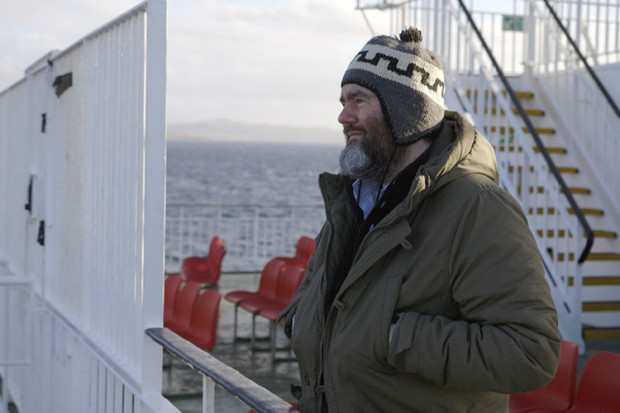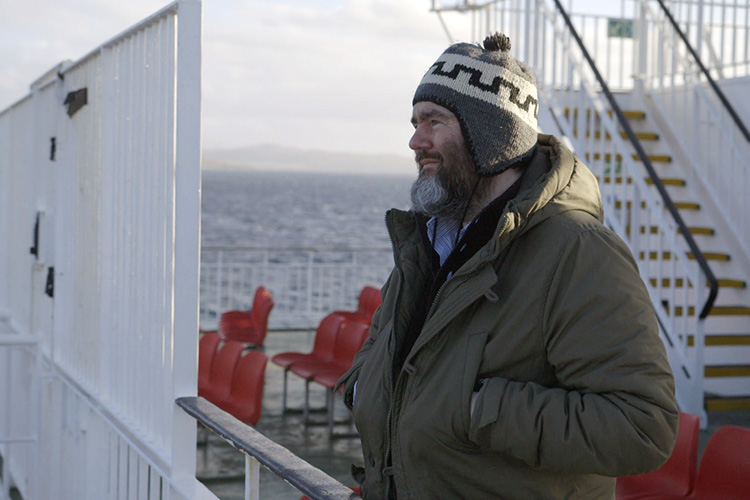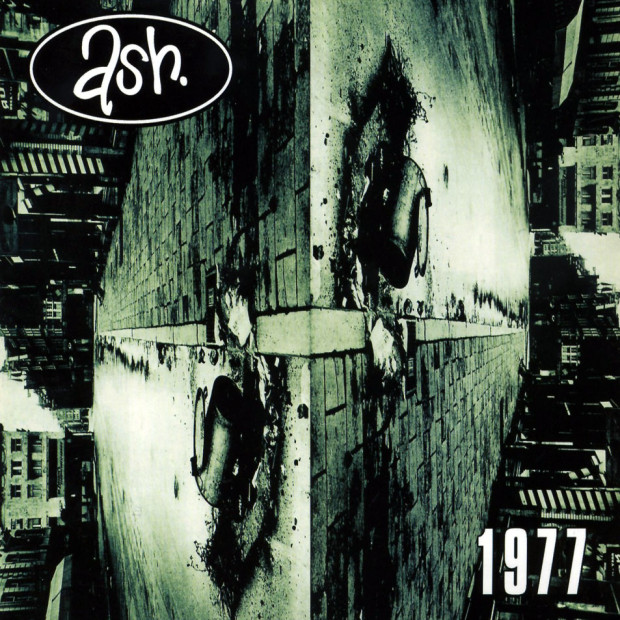As one half of the band Arab Strap with Malcolm Middleton between 1996 and 2006, Aidan Moffat quickly became one of the most influential voices in Scottish indie music. His unmistakable thick brogue and frank, confessional and often hilarious lyrics are reflected in so many newer Scottish bands while Moffat himself has guested with the likes of Mogwai and Frightened Rabbit over the years. Since Arab Strap’s amicable split, Moffat has undertaken all kinds of projects, from spoken word to his collaborations with Bill Wells to his electronic work as L. Pierre, to name a few.
In 2014 he toured the remote parts of Scotland performing his new interpretations of traditional Scottish folk songs, and brought along director Paul Fegan to film a tour diary style documentary, but the film took a different turn when Moffat encountered travelling balladeer Sheila Stewart, who objected to the notion of changing and rewriting these old songs. Stewart sadly passed away aged 79 in December of that year, but the resulting film, Where You’re Meant To Be, has been winning acclaim at screenings so far.
On Friday, April 29, the film will have its debut Belfast screening at the Black Box, courtesy of the Cathedral Quarter Arts Festival and Belfast Film Festival, and Aidan will be along perform a live set after. Cathal McBride spoke to Aidan about the film and his various other projects.
Go here to buy tickets to the show.
Hi Aidan. How have the film screening dates been going so far?
Well, we just finished the preview tour in Scotland and it was brilliant. The most worrying one was Blairgowrie which is the hometown of Sheila Stewart who’s a big feature in the film, and it went down really well, her granddaughter was there, her son was there, a few other family members and they all seemed to love it so we were very relieved, that was the real test, whether or not Sheila’s family would enjoy it.
Have you played Belfast before?
I’ve played Belfast a few times but haven’t been in a long time actually. My old band Arab Strap played there a few times, but I don’t think I’ve been there in ten years or so, the last time would have been around 2006, so I’m looking forward to it.
What can we expect from the live set? Can you tell us who you’ll be performing with, and will it mainly be songs from the film?
It is songs from the film yeah. We don’t want to keep people too long so what we’ll do is we’ll show the film obviously and then we’ll come on and do a few of the songs and maybe a few that weren’t part of the film too because I think there are about five songs in the film that I wrote for it, and that was from a set of ten that we did on the original tour, so we’ll do a few of those. On this trip I’m going to have Stevie Jones playing guitar and piano, and James Graham from The Twilight Sad is coming to do some singing with me too.
James has a great voice, so that should be good.
He does have a brilliant voice, yeah. Before he did the tour for this he hadn’t really done anything much outside of The Twilight Sad and certainly nothing in that sort of folk style but I think his voice really suits it.
How did the idea for the film initially come about?
Well it started as an idea just for a tour, I wanted to do something in the more traditional céilidh style – not céilidh as in dance, but the old way that was about a gathering of people and everybody did a song or a poem or something, everyone took their turn and I wanted to do a tour like that. And that was years ago. I spoke to the director, Paul, who’s someone I’ve known for years and he used to be a gig promoter. So I went to him with the idea of doing the tour because I thought he’d be into it. And he was, but we forgot about the idea, and in the meantime he started making films. By the time we got back to the idea he was looking to make a film, so it just started from there and it was really just about the people we met – and especially Sheila Stewart who pretty much dominated the film and summed up everything we wanted to say.
One of the main themes of the film turned out to be the disagreement between you and Sheila about whether or not traditional folk songs should be open to reinterpretation and reworking. Did you both find valid points in each other’s arguments?
Yeah, certainly. I think the thing with Sheila was, she disagreed with me but, you also, you can see it the film, she did kind of contradict herself. She used to understand that folk music was something that evolved and that people often rewrote for themselves, but as she got older she just started getting more protective of it, and she got very protective of one song. I chose the worst possible song I could have picked to do it with – I didn’t know it at the time, of course, but it transpired that this song was very close to her and was very close to her mum too, so of all the songs in Sheila’s repertoire I could have chosen I picked the worst one conceivable. But we got on, on other matters, certainly. She really wasn’t a fan of what I was doing but other than that, we did have a laugh here and there.
What do you think she would have made of the film in its finished form?
Well, it’s hard to say as I wouldn’t want to speak for her of course, but the test was her family, and her family and friends all love it, so that’s all we can really hope for now. I think she would have enjoyed the film, I hope she would have enjoyed it anyway. We were certainly very respectful that she got her opinions covered and we looked into her history and her lifestyle. So yeah, her friends and family think it’s great so that’s the only way we can really judge it now.
What’s next on your agenda, musically? Have you planned that far ahead?
Well, this year is going to be pretty much taken up with doing stuff for the film, but I’m just sitting back and writing stuff just now. I’m doing an album with R.M. Hubbard, who’s done a couple of albums for Chemikal Underground. We’ve been working on an album together so fingers crossed we’ll be at least finished writing it by the end of this year and then get it out next year.
It’s ten years this year since Arab Strap disbanded, but you’ve gone off in so many different directions since. Do you ever miss playing with Malcolm or are you more interested in what you’re doing now?
Yeah, I mean, it’s hard not to get a wee bit nostalgic about it sometimes, and certainly Malcolm and I get on much better now, because we’re not doing the band and we’re not living in each other’s pockets all the time, I think it’s a much healthier way to have a relationship! But yeah, I’m very very proud of Arab Strap and I’m very happy with what we did, but at the same time there are many, many new things I want to try. I’ve been trying to write a book as well, but that’s going to take years. I’ll be lucky if I finish that before I die!
What kind of book is it? A novel?
It’s actually just a book of short stories. There’s only ten stories in it and it’ll only be about 100 pages long but I still can’t fucking finish it! It’s a half-true travelogue kind of thing, but it’s taking me ages. I actually should be working on it today but I can’t be bothered.
Do you feel like you have more freedom to explore different projects as your mood takes you now, without having a band name tying to a particular sound?
Yeah, it’s good being able to move about and do different things. I think I’m lucky in that sense, in that, as you say, I’m not really tied to any particular sound of music. But I have such a distinctive voice – and that’s not necessarily a good thing! But you’ll always know it’s me when you hear it. But yeah, the last record I made with Bill Wells, The Most Important Place in the World, is one of my favourite things I’ve ever done, I really enjoyed that record and I loved playing it live, and that has an almost jazz feel to it as well, certainly a lot of jazz instruments. So yeah, I love trying different things.
Do you think you’ll be doing more albums with Bill Wells?
Bill and I are taking a bit of a break just now, because I’ve got the Hubby album and I’m doing the film this year, of course. But I think so, I really hope that Bill and I work together again, because we both really enjoy and I think what we do is great, so fingers crossed. I’m sure there’s more in us yet, but we’ll see, we just don’t know, we’re just having a wee break and then maybe in a year or two we’ll get back together and start writing again.
He’s clearly a very different type of musician and songwriter to Malcolm, but it does sound like you have a similar chemistry with them both, is that how it feels when you work together?
Yeah, well it’s funny – Malcolm and I were mates first and then decided we were going to make music together and it seemed to work well, but when you work with other people – like I met Bill through music, and Hubby I’ve known for a longer time but at the same time he was part of a music scene so, you have a different kind of relationship, when your relationship is rooted in a respect for each other’s music, it’s a different thing. There’s much less arguments for instance, I mean, Malcolm and I, we would fight all the time, and then storm out to the pub and come back two hours later and be friends, but that doesn’t really happen when your relationship is based on music. Don’t get me wrong, Bill and Hubby are very good friends as well, but we met through music, whereas Malcolm and I met through a haze of alcohol and drugs when we were young, which is a very different start to a relationship!
Do you have any favourite albums from throughout your career, or is that a bit like asking you to pick your favourite child?
Well, usually my favourite thing is always the last one. Well, there’s an album to accompany the film, but that doesn’t seem like my last album to me, because it was recorded, the tour was in 2014, so since then I released the album with Bill Wells, so I think that’s probably my favourite of the most recent stuff. But I often listen to them back and think they’re terrible! But it’s good, if I thought they were perfect I wouldn’t keep doing things, but you just start to notice the things you could have done better after a while, especially when you go out and tour a record, you often find when you come home and put the record on – don’t get me wrong, I don’t come home and sit and listen to my own records, it’ll be for reference or something, when you need to remember how to do a certain part, and then you just realise right away that now you’ve been touring it for two or three months you just know it so much better and it’s a much better performance you get live. It’s strange, a record really is just a document of how the songs sounded on that particular day. I think songs keep evolving as you continue to play them.
I’ve always liked How To Get To Heaven From Scotland [2009 album under the name Aidan Moffat & The Best-Ofs], were The Best-Ofs only ever intended as a one album band or is that just how it worked out?
Oh yeah, that was a strange one. When I made that record my son was pretty young, and I was pretty much the house-husband, my girlfriend was out working all the time so I decided to stay home, so I couldn’t really tour it. So it wasn’t really something that I went out and shouted about. But I really enjoyed the record, and I suppose there’s a sort of folk element to that record too so maybe that was the first that I tried with that. Actually I did one tour for that record, it was 9 days long and it was in Japan. That was it! And the only other gig we did was supporting Slint in the ABC in Glasgow, so it was a very strange campaign we had for that album. But yeah it was a one-off, I almost did another one but I had moved on and I think the Bill stuff came next.
Lastly, you’re always posting great music links on your twitter feed, what else are you listening to at the moment?
I have two records I got this week, one is by Jóhann Jóhannsson, and the other is Disruptive Muzak by a guy called Sam Kidel. What he did was he took the sounds of muzak, which of course is that terrible stuff they play down the phone at you when you’re waiting on something, and he made this strange version of that. The idea is that muzak should never be disruptive, it should be calm, it should never be distracting, so he took the sounds and made something that he considered distracting and the he phoned up lots of helplines and call centres, and instead of speaking to them, he just played his music at them, and then he recorded it. So there’s two sides to the album, one is the music with the people he called, and the other side is just the music. I mean, you cannnae dance to it! But it’s an interesting record and I think it’s quite good fun.






